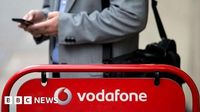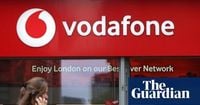On Monday, October 13, 2025, Vodafone, one of the United Kingdom’s largest telecommunications providers, was hit by a sweeping outage that left hundreds of thousands of customers across the country without broadband or mobile data. The disruption, which began in the early afternoon, quickly spiraled into one of the year’s most significant network failures, affecting not just individual consumers but also businesses, self-employed workers, and even Vodafone’s own retail shops.
The first signs of trouble appeared just after 2:30 PM BST, when users began reporting issues connecting to the internet and mobile networks. By 2:45 PM, the problem had escalated, and Downdetector—a service that tracks real-time outages—registered a dramatic surge in complaints. At the peak, nearly 140,000 people reported losing service, a number that underscored the scale of the disruption. According to BBC News, more than 130,000 customers flagged problems with Vodafone’s broadband or mobile network by Monday afternoon.
Vodafone, which serves over 18 million customers in the UK, including almost 700,000 home broadband subscribers, soon acknowledged the issue. In a statement shared with multiple outlets, a company spokesperson said, “We are aware of a major issue on our network currently affecting broadband, 4G and 5G services. 2G voice calls and SMS messaging were unaffected. We appreciate our customers' patience while we work to resolve this as soon as possible.”
The outage was not limited to Vodafone’s direct customers. Other networks that rely on Vodafone’s infrastructure, such as Voxi (a Vodafone-owned brand) and Lebara, also reported significant service interruptions. “Outages have been reported across multiple networks across broadband and mobile services,” Sabrina Hoque, a telecoms expert at Uswitch, told BBC News. She added that such incidents can be “a really frustrating experience for customers, especially when it's not clear how long it could last.”
For affected users, the disruption was more than just an inconvenience. Many found themselves unable to work, especially those who are self-employed or rely on digital connectivity for their livelihoods. One frustrated customer posted on X (formerly Twitter), “Never regretted more having my mobile and broadband on the same network.” Another wrote, “It’s like Vodafone has just been wiped off the earth. Not a single thing works.” Others lamented their inability to reach Vodafone’s customer service, website, or app—tools that are usually lifelines during technical issues but were themselves knocked offline by the outage.
As the outage wore on, Vodafone’s official network status checker also went down, leaving customers with little information about when service might be restored. Even the company’s customer service phone numbers were unreachable, compounding the sense of helplessness among those affected. By 5:00 PM, reports of problems were still pouring in, and many customers expressed frustration about the lack of updates or estimated time for a fix.
The impact was felt nationwide, with complaints logged from major cities including London, Cardiff, Birmingham, Glasgow, and Manchester. According to HELLO!, 63 percent of complaints related to landline internet accessibility, 28 percent to mobile data, and 9 percent to a total loss of signal. The outage also disrupted operations at some Vodafone retail stores, with handwritten signs posted in windows advising customers that the network was down and there was no clear timeline for resolution.
Amid mounting speculation about the cause, experts weighed in to calm fears of a cyber attack. Daniel Card, a cyber expert with BCS, The Chartered Institute for IT, told The Independent, “Incidents like this are often caused by a technical fault or configuration error rather than a major cyber-attack, so until more details are confirmed it’s best not to speculate.” He emphasized the importance of having teams capable of diagnosing and responding rapidly to network failures, noting that such events highlight the critical role of digital resilience in the modern age.
Cloudflare Radar, which monitors global internet traffic patterns, observed that Vodafone had “effectively dropped off the internet, with traffic dropping to zero” during the outage. Netblocks, another internet monitoring group, confirmed a “national outage” impacting both broadband and mobile data, corroborating widespread user complaints.
By Monday evening, there were tentative signs of recovery. Vodafone issued an updated statement saying, “This afternoon, for a short time, the Vodafone network had an issue affecting broadband, 4G and 5G services. 2G voice calls and SMS messaging were unaffected and the network is now recovering. We apologise for any inconvenience this caused our customers.” Downdetector’s graph of outage reports began to trend downward, though thousands of users still reported residual issues well into the night.
For many, the outage was a harsh reminder of the risks of relying on a single provider for both broadband and mobile services. Vodafone’s bundle deals, which promise savings for customers who consolidate their services, left some households completely disconnected. As one user put it on social media, “This is my sign to go reconnect with nature.”
Questions about compensation quickly surfaced, but telecoms expert Sabrina Hoque explained to TechRadar that customers are unlikely to be eligible unless their broadband connection is down for more than two days. “If your broadband connection goes down for more than two days, you could be entitled to compensation of £9.76 for each calendar day that the service is not repaired,” she said. For most affected by Monday’s outage, which lasted only a few hours, that threshold was not met.
Despite the disruption, other major networks such as Virgin Media, Three, and O2 reported no issues, reinforcing that the outage was isolated to Vodafone and its dependent brands. Some customers of other networks did report problems, but these were likely due to increased traffic as Vodafone users sought alternative ways to connect.
As the evening drew to a close, Vodafone’s network continued its slow recovery. The company has not yet disclosed the precise cause of the outage, but both internal sources and external experts continue to point to a technical fault or configuration error rather than a deliberate attack. For now, customers and businesses alike are left hoping for uninterrupted service—and perhaps rethinking the wisdom of putting all their digital eggs in one basket.
Monday’s outage may have lasted only a few hours, but for many, it was a stark lesson in the fragility of modern connectivity and the importance of robust digital infrastructure in an increasingly online world.






